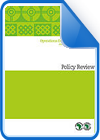Objective
The terms of reference for this evaluation define the scope of the Institutional and Policy Review (IPR) as follows: “This [the IPR] will examine how the corporate strategy and specific policies and guidelines on PBL1 [Policy Based Lending] have evolved in the Bank and the extent to which these provide a clear and coherent framework for the design and delivery of PBL. The study will also consider how Bank policy on PBL has been translated into decision making about the choice of aid instruments within country programmes; and the evolution of the Bank’s organisational structure, systems and staffing arrangements for delivering PBL over 1999-2009.”
Main Findings
- In both, ADF and ADB, the total amount of PBL provided rose in 1999-2004 but fell during 2005-2007. The average size of PBL for ADF grew but stabilized for ADB.
- Over the period 1999-2007, the number of operations rose between 1999-2001 and 2002-2004 but fell in 2005-2007 for both the ADF and ADB.
- Although the average size of PBL increased, total PBL funding increased and then declined to RMCs. The decline in PBL funding could be explained by funding conditions for ADF that are not as generous as those of other donors, and that funding conditions for ADB are not competitive compared to other multilateral banks as well as those of private financial markets
Main Lessons
- For the Bank Group: A relatively small number of conditions which are clearly defined, and based on a realistic assessment of borrower capacity, with complementary support provided to ensure conditions can be fulfilled and a participatory approach to strengthen ownership of the programme.
- The allocation of sufficient resources and skills to design and supervision. It appears that supervision has improved over the evaluation period and that the capacity of the Bank to act independently of other development partners (particularly the World Bank) has improved.
- Clarity in the relationship between the objectives of the programme (which should be measurable) and the specific activities that are undertaken, with risk analysis focused on the critical actions and relationships that will determine whether objectives are achieved.
- For the Bank Group: While single tranches have allowed more predictable disbursement (with additional tranches being subject to delay as clients have encountered difficulties in meeting later tranche conditions), multiple tranche operations have an advantage in that it is possible to programme resources over a longer time period than is possible for single tranche operations, and in having lower preparation costs and time requirements for a multiple tranche operation compared to a sequence of single tranche operations.


